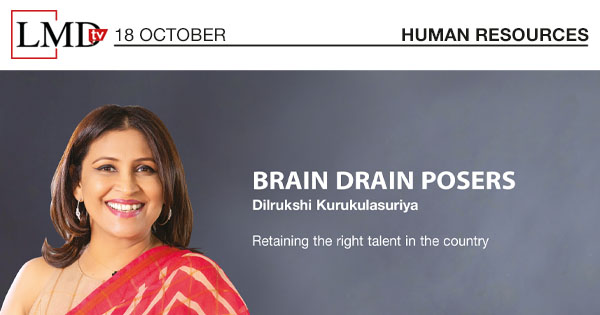 The uncertain economic climate in Sri Lanka has created many challenges for human resources (HR) professionals – and they revolve around retaining talent.
The uncertain economic climate in Sri Lanka has created many challenges for human resources (HR) professionals – and they revolve around retaining talent.
“Young professionals want things fast – they don’t like to live in uncertainty,” Executive Director and Chief Human Resources Officer of DIMO Dilrukshi Kurukulasuriya noted, in a recent LMDtv interview.
She stated: “There are very limited interventions that organisations can undertake to correct the country’s situation. However, it is important to keep employees engaged.”
“Employees like to know what companies think so communication is key, specifically in connection with senior management: what they think, company profitability, new ventures and how the economic climate impacts business,” she explained.
Kurukulasuriya added: “Sometimes what organisations have to say is not very positive but it’s still important to say it – transparency is crucial.”
In addition to implementing communication strategies to engage with employees, she also highlighted the importance of addressing their wellbeing in difficult situations. This, according to her, encompasses three aspects: mental, physical and financial wellbeing.
Kurukulasuriya also spoke about the brain drain, which is unfolding at an alarming pace and the adverse implications of this phenomenon.
“Even the government is encouraging people to migrate, thinking that there will be more [foreign] currency remittances; but we know it doesn’t happen that way,” she asserted, explaining that unlike domestic workers who leave our shores, remittances from professionals are very limited.
“The impact of brain drain is massive. It will not be seen immediately; but in the long term, this will be a significant challenge if it is not addressed immediately,” she cautioned.
Kurukulasuriya also mentioned that it is vital for Sri Lanka to have in place a proper manpower plan to assess the talent it needs to retain.
She elaborated: “The brain drain will create a skill gap in the country, and this will affect its socioeconomic growth and be one of the reasons that foreign investments will not flow into Sri Lanka.”
If there’s no talent in the country, investors have to spend more to hire foreign experts, she added. And as Kurukulasuriya said, “students and young professionals going overseas will leave us with an ageing population.”
She also pointed out that “gone are the days when organisations lose talent to competitors in the country. Now we have to compete globally.”
“Better opportunities, salaries and benefits are why professionals go overseas. Another reason could be the quality of life, opportunities for research and innovation, and children’s education,” she added.
“To counter these issues, as a country and as organisations, we have to create more opportunities for these professionals,” Kurukulasuriya urged, noting that “we have to match or offer competitive salaries and benefits.”
The Chief Human Resources Officer of DIMO stressed that it is vital for the government to establish a policy framework to address the brain drain, which is a national issue.
She also spoke about the need to promote diversity and inclusion in Sri Lankan organisations, and how HR can facilitate this: “Organisations are smaller ecosystems of society so we deal with people from various backgrounds with different perceptions of diversity.”
Kurukulasuriya continued: “As HR, what we could do is to address the elephant in the room, and create awareness about the unconscious biases that there are and how they will affect the creation of respectful workplaces – and look at interventions to eliminate these biases and bring in good practices.”
“It is important for top management to understand that HR cannot do this alone,” she emphasised, adding that HR and senior management must come together to establish policies and practices, measure their results and “embrace diversity as part of the culture.”

